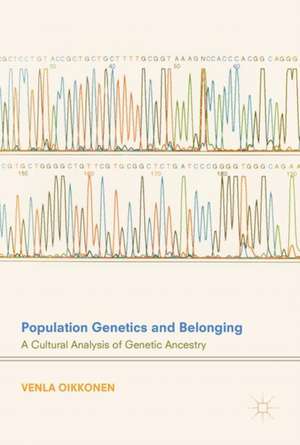Population Genetics and Belonging: A Cultural Analysis of Genetic Ancestry
Autor Venla Oikkonenen Limba Engleză Hardback – 28 sep 2017
This book explores how human population genetics has emerged as a means of imagining and enacting belonging in contemporary society. Venla Oikkonen approaches population genetics as an evolving set of technological, material, narrative and affective practices, arguing that these practices are engaged in multiple forms of belonging that are often mutually contradictory. Considering scientific, popular and fictional texts, with several carefully selected case studies spanning three decades, the author traces shifts in the affective, material and gendered preconditions of population genetic visions of belonging. Topics encompass the debate about Mitochondrial Eve, ancient human DNA, temporality and nostalgia, commercial genetic ancestry tests, and tensions between continental and national genetic inheritance. The book will be of particular interest to scholars and students of science and technology studies, cultural studies, sociology, and gender studies.
| Toate formatele și edițiile | Preț | Express |
|---|---|---|
| Paperback (1) | 383.33 lei 43-57 zile | |
| Springer International Publishing – 11 aug 2018 | 383.33 lei 43-57 zile | |
| Hardback (1) | 584.76 lei 43-57 zile | |
| Springer International Publishing – 28 sep 2017 | 584.76 lei 43-57 zile |
Preț: 584.76 lei
Preț vechi: 687.95 lei
-15% Nou
Puncte Express: 877
Preț estimativ în valută:
111.93€ • 121.62$ • 94.08£
111.93€ • 121.62$ • 94.08£
Carte tipărită la comandă
Livrare economică 21 aprilie-05 mai
Preluare comenzi: 021 569.72.76
Specificații
ISBN-13: 9783319628806
ISBN-10: 3319628801
Pagini: 240
Ilustrații: VII, 240 p.
Dimensiuni: 148 x 210 mm
Greutate: 0.44 kg
Ediția:1st ed. 2018
Editura: Springer International Publishing
Colecția Palgrave Macmillan
Locul publicării:Cham, Switzerland
ISBN-10: 3319628801
Pagini: 240
Ilustrații: VII, 240 p.
Dimensiuni: 148 x 210 mm
Greutate: 0.44 kg
Ediția:1st ed. 2018
Editura: Springer International Publishing
Colecția Palgrave Macmillan
Locul publicării:Cham, Switzerland
Cuprins
Chapter 1: Studying Population Genetics and Belonging.- Chapter 2: Mitochondrial Eve and the Affective Politics of Scientific Technologies.- Chapter 3: Imagining Origins through Ancient Human DNA.- Chapter 4: Evolutionary Nostalgia and the Temporality of Belonging.- Chapter 5: Genetic Communities and the Boundaries of Belonging.- Chapter 6: Reflections on Methodology and Biotechnological Change.- Index.
Notă biografică
Venla Oikkonen is Research Fellow at Helsinki Collegium for Advanced Studies, Finland. Her research explores cultural aspects of genetics, evolutionary theory, and vaccine controversies. She is the author of Gender, Sexuality and Reproduction in Evolutionary Narratives, and received the 2015 Catharine Stimpson Prize for Outstanding Feminist Scholarship.
Textul de pe ultima copertă
This book explores how human population genetics has emerged as a means of imagining and enacting belonging in contemporary society. Venla Oikkonen approaches population genetics as an evolving set of technological, material, narrative and affective practices, arguing that these practices are engaged in multiple forms of belonging that are often mutually contradictory. Considering scientific, popular and fictional texts, with several carefully selected case studies spanning three decades, the author traces shifts in the affective, material and gendered preconditions of population genetic visions of belonging. Topics encompass the debate about Mitochondrial Eve, ancient human DNA, temporality and nostalgia, commercial genetic ancestry tests, and tensions between continental and national genetic inheritance. The book will be of particular interest to scholars and students of science and technology studies, cultural studies, sociology, and gender studies.
Caracteristici
Introduces readers to population genetics in an accessible and engaging style Highlights the mutual entanglement of genetic science and society Identifies and characterises different aspects of popular engagement with population genetics, and shows how these are implicated in discourses of gender, sexuality, race and class
